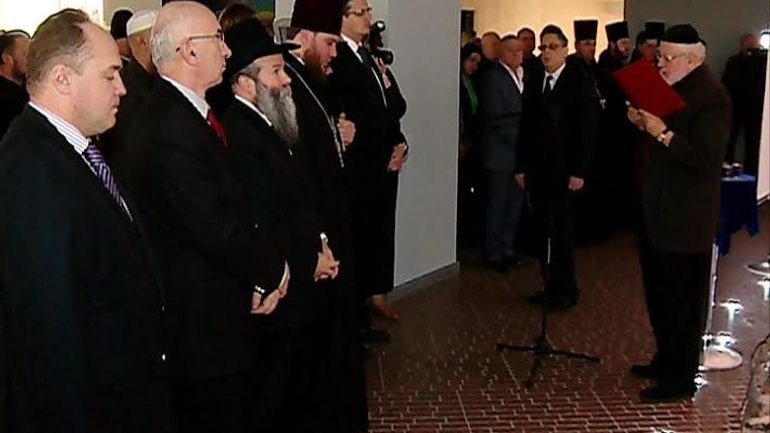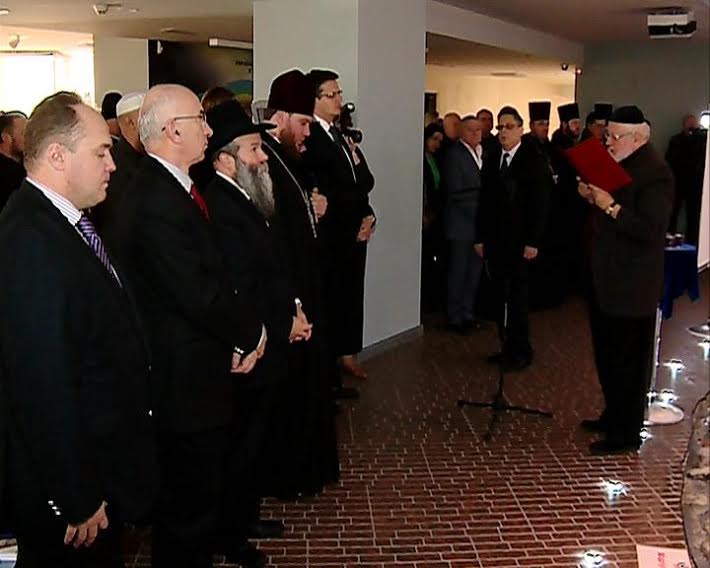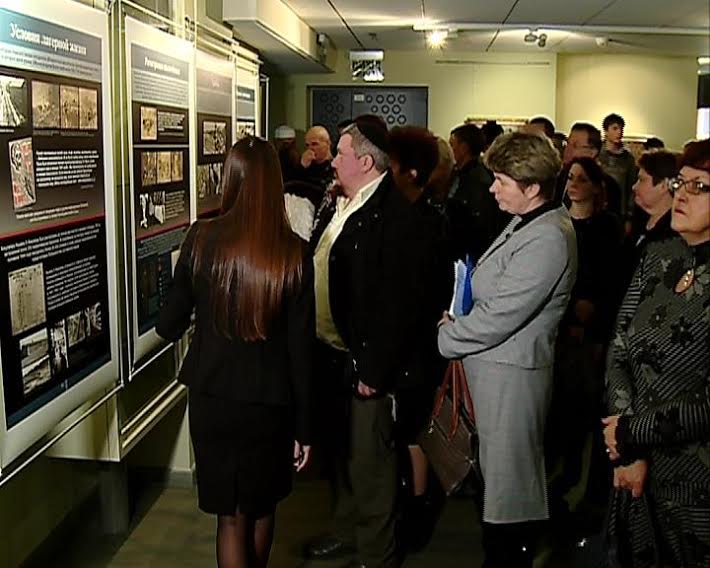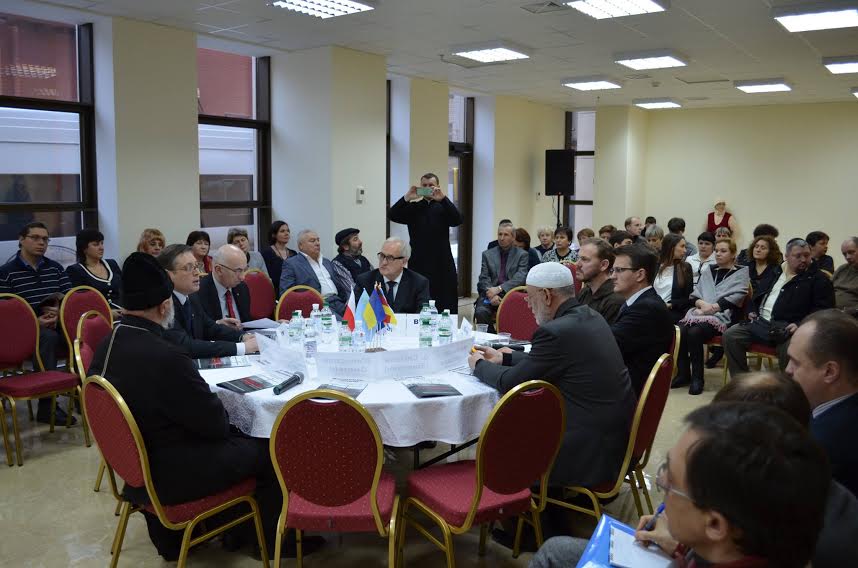Officials, religious leaders and community members gather in Dnipropetrovsk to mark 70th anniversary of the Holocaust

Dnipropetrovsk honored the memory of the Holocaust victims. The ceremony was held at the Museum of "Memory of the Jewish people and the Holocaust in Ukraine", located in "Menorah" center. Members of the EU delegation who arrived in the city with a humanitarian mission assembled at the event. The representatives of religious communities of the city also expressed sympathy with the tragedy of the Jewish people. The event began with a joint prayer, in particular, for the victims in eastern Ukraine.
 Bishop Symeon of Dnipropetrovsk and KryvyiRih of the UOC-KP said: "History is great whatever sad itmight be. Today I would like to thank the Institute (“Tkuma” Institute for Holocaust), which now holds an active position, revives page by page, searching for the true story of the deceased people. I believe that this is our common grief. I believe in what we are united today.”
Bishop Symeon of Dnipropetrovsk and KryvyiRih of the UOC-KP said: "History is great whatever sad itmight be. Today I would like to thank the Institute (“Tkuma” Institute for Holocaust), which now holds an active position, revives page by page, searching for the true story of the deceased people. I believe that this is our common grief. I believe in what we are united today.”
“History has a habit of repeating,”believes Chancellor of Donetsk Exarchate of the UGCC Vasyl Pantelyuk, and added that the Holocaust was a great tragedy of the Jewish people, like the Ukrainian Famine of 1932-1933.
 Now the residents of Ukraine, regardless of nationality or religion, are affected by war in the East. And nobody knows what losses we will sustain. So the believers of various faiths pray for peace.
Now the residents of Ukraine, regardless of nationality or religion, are affected by war in the East. And nobody knows what losses we will sustain. So the believers of various faiths pray for peace.
"The historical examples show that the human mind can be artificially darkened. In any country one needs a permit to be issues weapons, the certificate from a psychiatrist. But when today the Grad systems are launched no information is requested. Today we must unite and not allow humanity to lose mind,” said RamzanKurbanov, Head of the Muslim religious community of Dnipropetrovsk.
Now in Dnepropetrovsk about a thousand of Jews – the Holocaust victims live. They and the whole community are afraid of a new war and understand its consequences. “We are talking about 5-6 thousand victims in Ukraine now. It seems to be not too much when compared to the six million Jews who perished during the Holocaust. But we are talking about tens of millions of people living in fear and panic. And today we pray onto the Almighty and hope that is quickly over,” concluded Chief Rabbi of Dnepropetrovsk region Shmuel Kaminezki.
 The same day, in Menorah center the exhibition featuring “The Nazi German death camp - Auschwitz concentration camp”was launched. The boards with photocopies of documents relating to the establishment of special care institutions, the work of all its three divisions were provided by the Polish side of the public memorial. Up to now the exact number of dead and the dead has not been established. However, the museum officially indicates the number of half a million people. Among them, 15 thousand Soviet prisoners of war, 21thousand Gypsies, at least 70 thousand Poles and over one million Jews. According to Igor Shchupak, Director of the Museum of“Memory of the Jewish people and the Holocaust in Ukraine" and “Tkuma” Ukrainian Institute for Holocaust, the Auschwitz-Birkenaucamp was the" symbol of the Holocaust and Genocide in general. “We hope that people who view this exhibition will understand: the lessons of history are not abstract. Because todaythere is a war. Today there are people who advocate the supremacy of others, in particular, to Ukrainians. Today there are people who for fun or for other unknown reasons are saying that they are going to kill the “Ukres”(Ukrainians). Therefore, this exhibition is extremely relevant for Jews, Ukrainians, Russians, and for all normal people,” he added.
The same day, in Menorah center the exhibition featuring “The Nazi German death camp - Auschwitz concentration camp”was launched. The boards with photocopies of documents relating to the establishment of special care institutions, the work of all its three divisions were provided by the Polish side of the public memorial. Up to now the exact number of dead and the dead has not been established. However, the museum officially indicates the number of half a million people. Among them, 15 thousand Soviet prisoners of war, 21thousand Gypsies, at least 70 thousand Poles and over one million Jews. According to Igor Shchupak, Director of the Museum of“Memory of the Jewish people and the Holocaust in Ukraine" and “Tkuma” Ukrainian Institute for Holocaust, the Auschwitz-Birkenaucamp was the" symbol of the Holocaust and Genocide in general. “We hope that people who view this exhibition will understand: the lessons of history are not abstract. Because todaythere is a war. Today there are people who advocate the supremacy of others, in particular, to Ukrainians. Today there are people who for fun or for other unknown reasons are saying that they are going to kill the “Ukres”(Ukrainians). Therefore, this exhibition is extremely relevant for Jews, Ukrainians, Russians, and for all normal people,” he added.
After the ceremony commemorating the victims of the Holocaust and the tour of the exhibition, the guests met at a round table. Ukrainians, Jews, Poles, Germans, Armenians and Azerbaijanis, clergymen and community leaders spoke on “Totalitarianism, the Holocaust and modern war.” According to Igor Shchupak, the discussion has left more questions than answers. This information was reported to RISU by Sofia Bohutska from Dnipropetrovsk.









